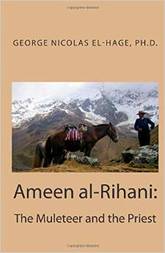Ameen al-Rihani: The Muleteer and the Priest
Al-Rihani’s book, The Muleteer and the Priest, summarizes his position on the clergy and their role. Placed in its proper historical context, this novella is revolutionary in its content, topic and message. It is clear that the muleteer, the immigrant returning from America, is the mouthpiece for the author himself, while the priest stands for all the clergy. In this book, al-Rihani emerges as a social and religious reformer at his best. He ultimately helps Father Yusuf to redeem himself and become a true and enlightened human being, spiritually elevated and morally correct. The muleteer, a prophet in his own right, an honest and enlightened soul, awakens the consciousness of the priest to al-Rihani’s message that recalls the teachings of both Blake and Emerson: “ Everything that lives is Holy,” and “Man is a god in ruins.” The muleteer teaches the priest the true meaning of Christ’s ministry and message. He shows him that organized religion is corrupt and that only true and sincere spiritual enlightenment leads to the Kingdom of Heaven. Every human being is sacred and, as Gibran said: “You are your own priest… the church is within you.” The priest, who would become a muleteer, denounces his old ways and adopts the words of abu Tannous after he realizes that such are the true teachings of the Bible. Abu Tannous, who speaks for the author, also personifies the characters of some prophets of the Old Testament. When under the flame of inspiration and Heavenly Guidance, he reaches the peak of human perfection and becomes capable of performing miracles and causing changes by stepping into history and altering the course of events. He is certainly the forerunner of Khalid, the Enlightened One, who reached his Over Soul, his Greater Self, the God-Head within himself. All the teachings of the American Transcendentalists, of Gibran, Blake, and Naimy, and the message of the New Testament are summoned here and summarized in the voice of abu Tannous (al-Rihani), the clear voice of prophecy that leads to the only path of redemption and salvation. As a Unitarian, Al-Rihani believed that all prophets: “Confucius, Buddha, Zarathustra, Socrates, Moses, Jesus, Muhammad, Bahaullah, Mary Baker Edde, and many others” came from one source. Al-Rihani believed that life had no value without its aspiration towards the “Greater Love,” the “Love of Nature, Love of Humanity, and Love of God.” Only such formidable love will liberate us and bring forth the Godliness within us. Our faith in God does not negate our belief in science. It is the mission of science to uncover and solve the spiritual secrets that man can only experience through faith.
Al-Rihani’s book, The Muleteer and the Priest, summarizes his position on the clergy and their role. Placed in its proper historical context, this novella is revolutionary in its content, topic and message. It is clear that the muleteer, the immigrant returning from America, is the mouthpiece for the author himself, while the priest stands for all the clergy. In this book, al-Rihani emerges as a social and religious reformer at his best. He ultimately helps Father Yusuf to redeem himself and become a true and enlightened human being, spiritually elevated and morally correct. The muleteer, a prophet in his own right, an honest and enlightened soul, awakens the consciousness of the priest to al-Rihani’s message that recalls the teachings of both Blake and Emerson: “ Everything that lives is Holy,” and “Man is a god in ruins.” The muleteer teaches the priest the true meaning of Christ’s ministry and message. He shows him that organized religion is corrupt and that only true and sincere spiritual enlightenment leads to the Kingdom of Heaven. Every human being is sacred and, as Gibran said: “You are your own priest… the church is within you.” The priest, who would become a muleteer, denounces his old ways and adopts the words of abu Tannous after he realizes that such are the true teachings of the Bible. Abu Tannous, who speaks for the author, also personifies the characters of some prophets of the Old Testament. When under the flame of inspiration and Heavenly Guidance, he reaches the peak of human perfection and becomes capable of performing miracles and causing changes by stepping into history and altering the course of events. He is certainly the forerunner of Khalid, the Enlightened One, who reached his Over Soul, his Greater Self, the God-Head within himself. All the teachings of the American Transcendentalists, of Gibran, Blake, and Naimy, and the message of the New Testament are summoned here and summarized in the voice of abu Tannous (al-Rihani), the clear voice of prophecy that leads to the only path of redemption and salvation. As a Unitarian, Al-Rihani believed that all prophets: “Confucius, Buddha, Zarathustra, Socrates, Moses, Jesus, Muhammad, Bahaullah, Mary Baker Edde, and many others” came from one source. Al-Rihani believed that life had no value without its aspiration towards the “Greater Love,” the “Love of Nature, Love of Humanity, and Love of God.” Only such formidable love will liberate us and bring forth the Godliness within us. Our faith in God does not negate our belief in science. It is the mission of science to uncover and solve the spiritual secrets that man can only experience through faith.

